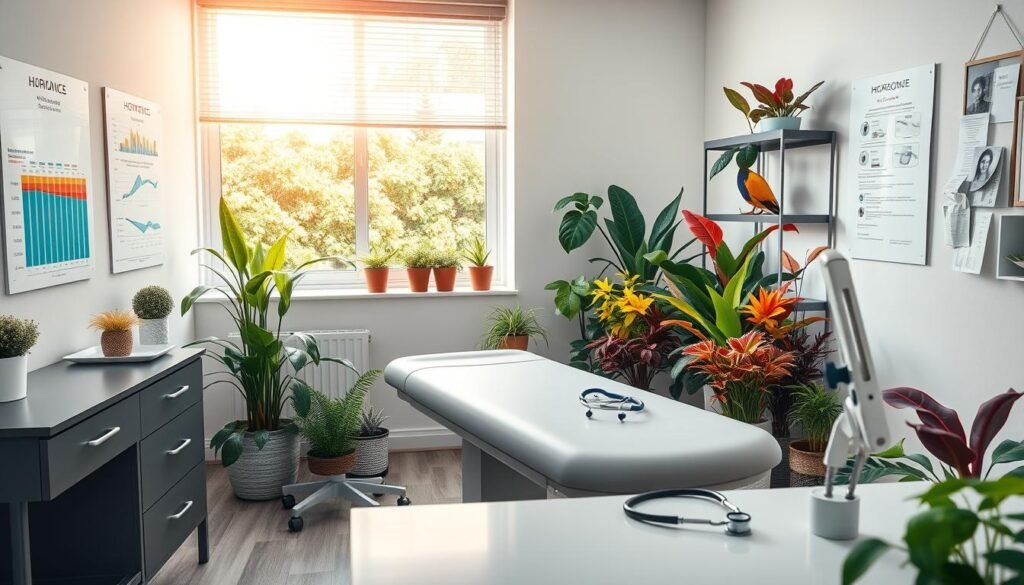Did you know that nearly 22% of people have insomnia? This number even jumps to 50% for those over 65. It’s a big issue, especially for women. They are more likely to face sleepless nights – 1.5 times more than men. A key reason behind this is hormones like progesterone.
When women reach stages like menopause, their progesterone levels drop. This decrease affects how well they sleep, leading to insomnia and other sleep problems. It’s important to understand the link between progesterone and not sleeping well. Especially for those dealing with hormonal imbalances.
Key Takeaways
- Low progesterone levels can lead to significant sleep disturbances.
- Women, particularly during menopause, are at a higher risk for insomnia.
- Progesterone supplementation may be beneficial but is not a first-line treatment for sleep problems.
- Nearly one-third of the general population reports sleep disturbances.
- Understanding hormonal imbalances can offer insights into improving sleep quality.
Understanding Progesterone
Progesterone is a key hormone for women’s health. It helps control your menstrual cycle and keeps pregnancy going. It affects many parts of your body. Changing levels of progesterone can affect your sleep.
What is Progesterone?
After an egg is released, the ovaries make progesterone. It readies the uterus for a possible pregnancy. If no pregnancy occurs, progesterone levels fall, and menstruation starts. Besides the menstrual cycle, progesterone is vital for reproductive health. Not enough progesterone can cause irregular periods and disturb sleep.
Role of Progesterone in Reproductive Health
Progesterone is crucial for reproductive health. It assists with several key tasks:
- It readies the uterus for a baby.
- It keeps the uterine lining healthy in early pregnancy.
- It manages your monthly cycle.
A drop in progesterone can lead to PMS and make getting pregnant harder. An imbalance of progesterone and estrogen can cause serious issues, like insomnia. Balancing these hormones might help regulate your period and improve sleep. This could make you healthier overall.
Symptoms of Low Progesterone
Low progesterone affects overall well-being, leading to changes in health and mood. Women often see signs when levels fall, usually during perimenopause and menopause. These symptoms usually mean a hormonal imbalance. This can disturb daily life and sleep quality.
Common Signs of Hormonal Imbalance
Low progesterone shows up in many ways. Signs include:
- Mood swings and more anxiety
- Irregular periods and unusual bleeding
- Hot flashes and night sweats
- Lowered sex drive
- Tiredness and low energy
It’s vital to watch hormone levels, especially nearing menopause. For more, see this low progesterone symptoms resource.
Impact on Sleep Quality
Many women link sleep problems to hormonal changes. The connection between low progesterone and sleep issues is clear. Insomnia from hormones may include:
- Struggle to fall or stay asleep
- Waking up a lot at night
- Unsteady sleep patterns
- Being tired and irritable during the day
- Hard time focusing and handling stress
Improving sleep hygiene helps these issues. This means making bedtime peaceful, avoiding distractions, and not eating heavy or drinking alcohol late. Understanding hormonal imbalance helps in managing it, especially with tough insomnia symptoms. Learn more about sleep and hormones here: sleep quality and hormonal changes.
Progesterone and Insomnia: The Connection
Progesterone affects how well women sleep, especially during menopause. Studies show it’s key for good sleep. It helps by making you sleepy and less anxious. But as women age, they make less progesterone. This can make sleeping well hard.
How Progesterone Affects Sleep Patterns
Progesterone helps control our sleep cycle. But when it goes up right before a period, it can mess with sleep. Women might find it hard to sleep well due to these changes. And pregnancy can make this even trickier, despite making you more tired.
This is one reason why women often have more trouble sleeping than men. The ups and downs of progesterone really do affect sleep.
Effects of Hormonal Changes During Menopause
Menopause can make it hard to sleep because of less progesterone. Many women, about 40-60%, don’t sleep well during this time. Hot flashes and night sweats don’t help either. So, this drop in hormones can really hurt the quality of sleep.
But, there’s hope. Making some changes in your life or getting medical help can ease insomnia. This way, you can sleep better even during menopause.
Sleep Disturbances Linked to Hormonal Imbalance
Many women struggle with sleep disorders during different stages of life. These can be due to changes in reproductive hormones. Knowing more about this can help solve sleep problems.
Common Sleep Disorders in Women
Women often report sleep disorders such as:
- Insomnia: This means having trouble falling or staying asleep. It’s common when hormones change, like during menopause.
- Sleep Apnea: A serious issue where breathing stops and starts in sleep, linked to hormonal problems.
- Restless Leg Syndrome: This causes a strong need to move the legs. Women are mainly affected.
Women are more prone to insomnia than men. This happens particularly during their menstrual cycles, pregnancy, and menopause. It’s important to understand sleep disorders in women well.
Impact of Hormonal Fluctuations on Circadian Rhythms
Hormones play a big role in our sleep patterns. Stress can increase cortisol levels, which may hurt sleep quality. Sleep apnea can also mess with hormone levels, leading to metabolic issues. About two-thirds of women going through perimenopause face hot flashes and sleep troubles.

Studies show that estrogen therapy can help with sleep problems. This information was shared by the American College of Obstetricians and Gynecologists. Getting a professional’s opinion and the right treatment can really help.
| Sleep Disorder | Symptoms | Link to Hormonal Changes |
|---|---|---|
| Insomnia | Difficulty falling/staying asleep | Menopause, PMS |
| Sleep Apnea | Breathing interruptions | Hormonal fluctuations |
| Restless Leg Syndrome | Urge to move legs | Pregnancy, hormonal transitions |
Menopausal Symptoms and Sleep Issues
Menopause brings major hormonal changes. These impact a woman’s sleep a lot. Challenges like night sweats and mood swings are common. They make sleeping hard. Learning about these troubles helps in managing them.
How Menopause Affects Sleep Quality
Menopause often leads to less restful sleep. Women wake up often during the night. Between 35% to 60% of postmenopausal women face such sleep disturbances. Hormone changes and stress play a big part in these issues. These changes make staying asleep difficult. Hot flashes are a major cause of sleep problems during menopause.
Night Sweats and Insomnia
Night sweats are a big problem during menopause, causing insomnia. These episodes disturb sleep a lot. Postmenopausal women are more likely to have sleep apnea than before menopause. Working out regularly helps with sleep. Also, some medications like SSRIs can ease these sleep issues.
| Menopausal Phase | Prevalence of Sleep Disturbance |
|---|---|
| Premenopausal | 16% to 42% |
| Perimenopausal | 39% to 47% |
| Postmenopausal | 35% to 60% |
Natural Sleep Remedies
For those dealing with insomnia, various natural sleep remedies can help. People with hormonal imbalances may benefit from home remedies and lifestyle changes. These steps can help you sleep better and improve your well-being.
Home Remedies for Better Sleep
Many have improved their sleep using natural sleep remedies. Popular choices include:
- Ashwagandha
- Valerian root
- Lemon balm
- Magnesium supplements
- GABA and L-theanine
- Melatonin
It’s important to research these options. The FDA does not closely regulate supplements. To ensure quality, look for products that follow Good Manufacturing Practices (GMP). Also, check for seals from NSF International or U.S. Pharmacopeia.
Importance of Lifestyle Changes
Making lifestyle changes is key to better sleep. Here are some helpful tips:
- Have a regular sleep schedule by going to bed and waking up at the same time every day.
- Avoid caffeine and alcohol before bed.
- Make your sleeping space comfortable. Pay attention to temperature, light, and noise.
- Stay active. It helps fight insomnia.
- Try relaxation techniques like yoga or meditation to lower stress.
These lifestyle changes not only help with sleep but also balance hormones. By focusing on these methods, you may see a reduction in insomnia due to hormonal shifts.

Hormonal Therapy Options
Managing sleep problems from low progesterone often includes looking into hormonal therapy options. Hormone replacement therapy helps women with menopause symptoms. Bioidentical hormones stand out as a natural alternative to traditional hormone therapies.
Bioidentical Hormones: An Overview
Bioidentical hormones come from plants and match the body’s own hormones. They are usually safer than synthetic hormones, with fewer risks and side effects. These hormones, especially estrogen and progesterone, help with sleep and more.
Pros and Cons of Hormone Replacement
Hormone replacement therapy improves sleep for menopausal women. It combines estrogen and progesterone to lessen insomnia. Yet, it’s important to consider some drawbacks:
| Pros | Cons |
|---|---|
| Improves sleep quality | Possible side effects like bloating or mood changes |
| Alleviates menopausal symptoms | Risk of health issues, like blood clots, goes up |
| Customizable treatments | Not a fit for everyone (e.g., those with certain medical histories) |
| Uses bioidentical substances | Requires regular checks and tweaks |
Choosing the right hormone therapy requires a personalized plan. A healthcare provider can guide you through your options. The right choice can lead to better sleep and overall health.
Consulting Your Doctor About Sleep
Talking to doctors about sleep and hormones is key. Patients should discuss their issue openly and get advice. Preparing hormone therapy questions beforehand improves understanding and care.
Questions to Ask About Hormonal Therapy
Before starting treatment, talk about the medication options. Key hormone therapy questions include:
- What are the different types of hormonal treatments available?
- How might these treatments relieve my sleep issues?
- What are the potential risks and benefits associated with hormonal therapy?
- How will we monitor my progress and any side effects from the treatment?
- Are there any lifestyle changes I should consider alongside the therapy?
Managing Side Effects of Hormonal Treatments
Knowing about side effects is crucial during hormonal therapy. There are ways to handle side effects. It’s important to ask your doctor:
- What common side effects should I expect, and how can I alleviate them?
- Are there any signs of serious side effects that I should be aware of?
- How can I incorporate supportive therapies or lifestyle adjustments to minimize discomfort?
For more tips on discussing insomnia with your doctor, check out this resource here.

Research on Progesterone and Sleep Quality
Recent research studies show how important progesterone is for sleep, especially for women facing hormonal changes. Low levels of progesterone often link to sleeping problems, like insomnia. When hormones fluctuate, people might find it hard to stay asleep, mainly in the luteal phase.
Studies Supporting Progesterone’s Role in Sleep Improvement
Progesterone seems to help with sleep, especially among post-menopausal women. About 40 to 60% of these women struggle with sleep. Progesterone might not cure sleep disorders but can ease some symptoms of hormonal changes. It helps reduce hot flashes, night sweats, and mood swings.
Future Directions in Hormonal Sleep Research
The research into progesterone and sleep is growing. Future studies will look more into how it can improve sleep quality. They aim to create tailored treatments, benefiting menopausal women and others with hormonal issues. Researchers want to understand how progesterone levels affect different sleep problems.
Conclusion
The relationship between progesterone and not sleeping well is important. It shows how hormones impact sleep. Research shows that people with sleep problems often have hormone changes. This is especially true for women. For example, a study with over 4,000 young women found 11.6% struggled with sleep in six months. This shows how crucial it is to understand progesterone’s effects on sleep and health.
Noticing the link between hormones and sleep is key for those with sleep issues. Sleep problems are more common in women than men. Women are about 1.5 times more likely to have insomnia. Studies suggest that progesterone levels can cause different symptoms. But how it directly affects sleep can vary. Ongoing research highlights the need for more in-depth studies. This includes exploring how hormone therapy could help.
Learning about hormonal health can help people find better treatments. It’s important to talk with doctors about progesterone levels and sleep. For more information, check out this research paper. It offers a detailed look at hormonal sleep research. It also talks about what the future might bring in this field.